I know it has been a while since I’ve written a blog post, but recent news has taken me out of my literary slumber to talk a little about a blog post that is causing quite a stir on social media, especially on Facebook: Amazon’s New Review Policy.
We are no strangers to Amazon’s never-ending quest to eradicate unethical reviews from reaching their market sites. And that is okay. The more honest and transparent a company is, the better its customers will trust the products sold on their site, and the better their profit return will be.
But that isn’t always the case…
Last July, Amazon implemented changes to their system—specifically to the Kindle Direct Publishing Select Program (also known to readers as Kindle Unlimited), of how payment disbursements are made. Pages read versus their previous business model where an author was paid for the total cost of the eBook once the reader reached ten percent (10%)…but don’t quote me on that, as I have never enrolled my back list titles into KDP Select so…
These changes caused uproar in the self-publishing community, but that, as we all know is old news. As part of their changes to KDP Select, Amazon rolled out new algorithms which, in essence, search for patterns and associations, predominately between an author and reviewer. Due to blatant unethical behavior of buying both verified and un-verified reviews by the hundreds by authors—both traditionally and self-pubbed—Amazon had no choice but to crack down on the legitimacy of reviews that are posted on their market sites. Imagine having a large company with billions of customers, who love or hate a product, and are ready to write a review…it would be impossible for a group of people to manually review every recorded word in a product review (sorry for the redundancy there)…
To make it easier, these algorithms enabled Amazon to determine whether or not a review is legitimate. Sadly, legitimate reviews I’ve written for products I have purchased, were either rejected, or deleted due to a disconcerting notion that “I know the author personally”. When it first happened, I was in complete shock. I didn’t understand how Amazon was coming to that determination. Then it dawned on me, I was following the authors whose books I was reviewing on Amazon on Social Media (Facebook, Twitter, Google+, tsu, Goodreads etc.). In my blog post, I didn’t argue the fact that my review was rejected, but more so on the basis as to why it wasn’t allowed to upload. How did they know I was following and/or connecting with authors on social media? It concerned me that Amazon had easy access to my social media profiles which all have privacy settings…
Since writing my blog post, Amazon did come forward and admit they were, in fact, using data mining to curb the amount of unethical reviews from reaching their site, and bravo to them for stepping up to the plate. If our social media activity is being monitored, we deserve to know it—call it a fair business practice if you will. Now, what still weighs on my mind, and that of others, is that just because we follow, or even “friend” authors on social media, it doesn’t mean we know them personally, and thus not allowing us to continue to write unbiased, honest, and fair reviews is ludicrous…but that is subject for another blog post for another day…
As far as my own personal experience goes—in my blogger capacity—since July 2015, eight out of ten reviews I compose for eBooks I have purchased are rejected, and in the rare instances that they aren’t, they are swiftly deleted from their website within twenty-four hours. When I wrote about my issues with this back in July, I wasn’t able to share screenshots due to not having an application to blur out sensitive information. And this is where I want to go back to the blog post that hit the waves recently and is causing uproar within the publishing community today.
I, for one, never link my social media accounts to any consumer websites, including but not limited to, Amazon. Why? I don’t think a website should have access to my information other than my payment method and shipping address. Sounds fair, right? They don’t need to know I have successfully managed to pop a zit, or know why I haven’t brushed my hair in two days…you get where I’m going with this. And what is more concerning is that despite not having social media accounts linked to Amazon, associations are still being made, and reviews are still rejected, or worse, deleted. Many are clamoring to unlink your social media accounts from Amazon, but I’ll show you that despite doing that, Amazon still has a way to track your “friendships and follows” on social media. And how they do this we will never know. Some say cookies, others say clear your cache etc. I’ve done it all, and still, I’m struggling with the same problem.
Here goes.
The below image shows *gasps* my review for an eBook made it through! Hooray!
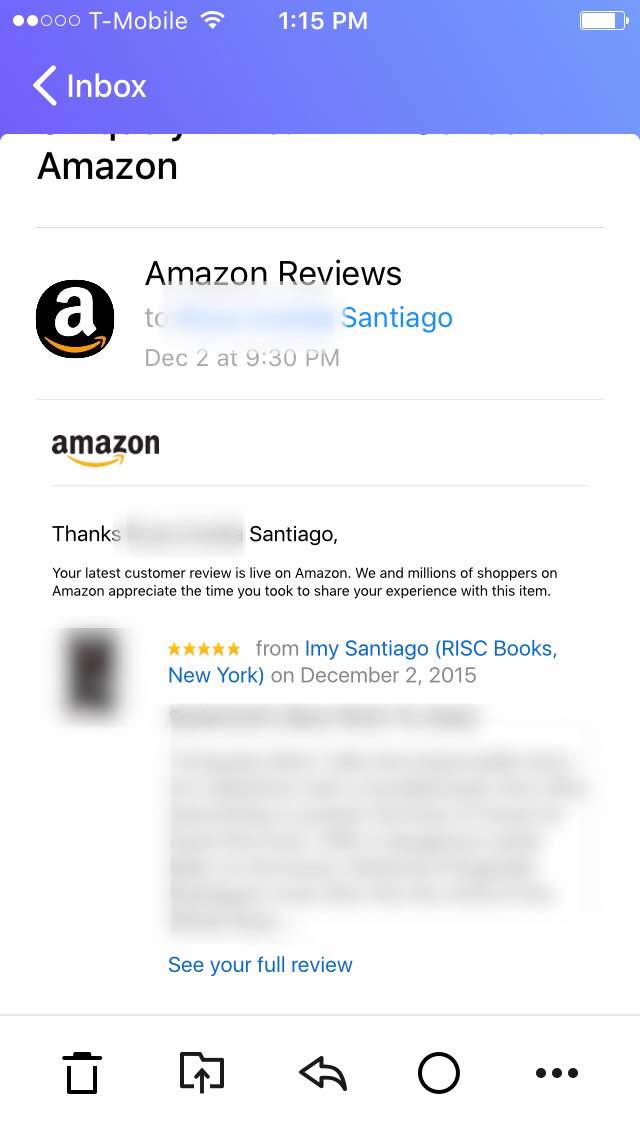
Not. But when you click on the “See your full review” hyperlink, it takes you here.
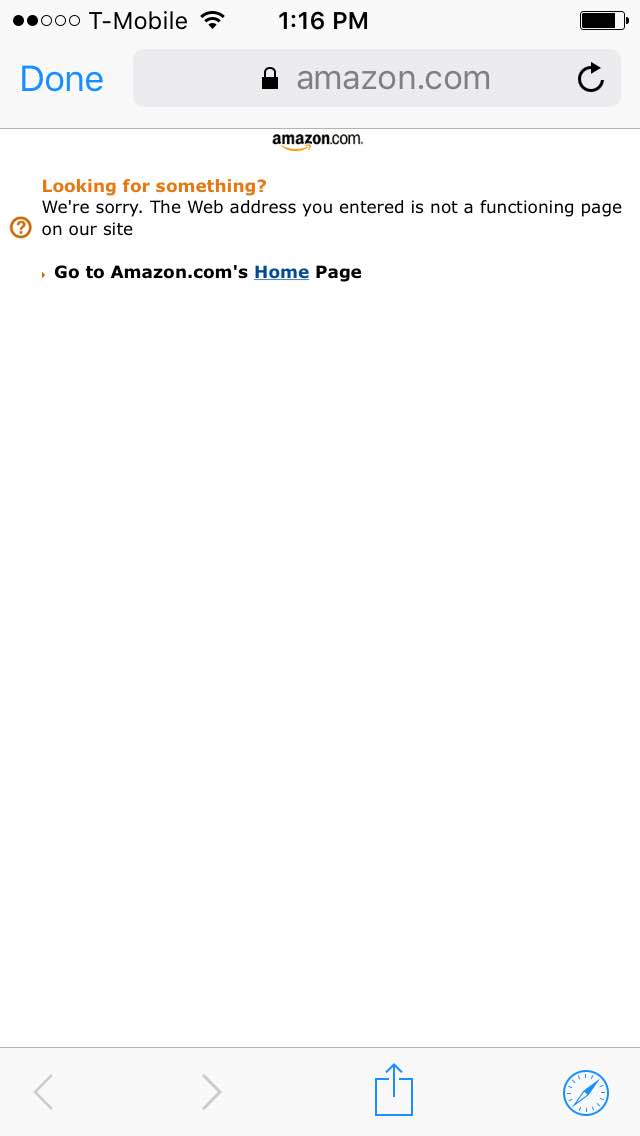
So yes, the review was deleted.
For all intents and purposes I will show you I don’t have any social media accounts linked to Amazon.

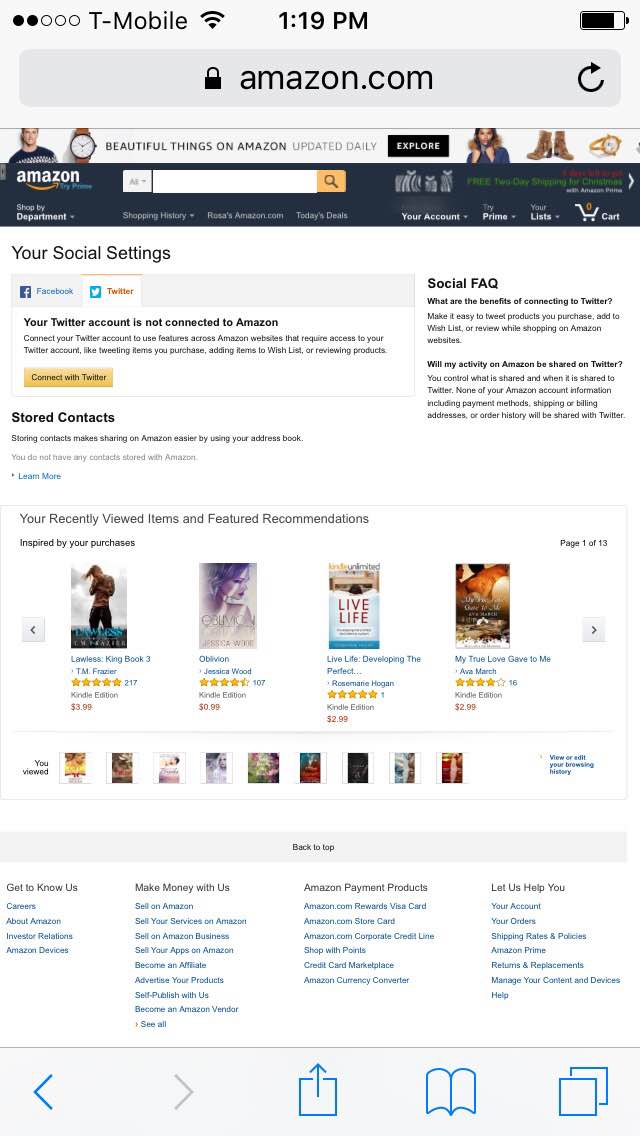
Full disclosure: I still post all of my reviews on Amazon’s sister site, Goodreads. None of my reviews have been rejected, or deleted. Regardless, I refuse to link my social media there as well.
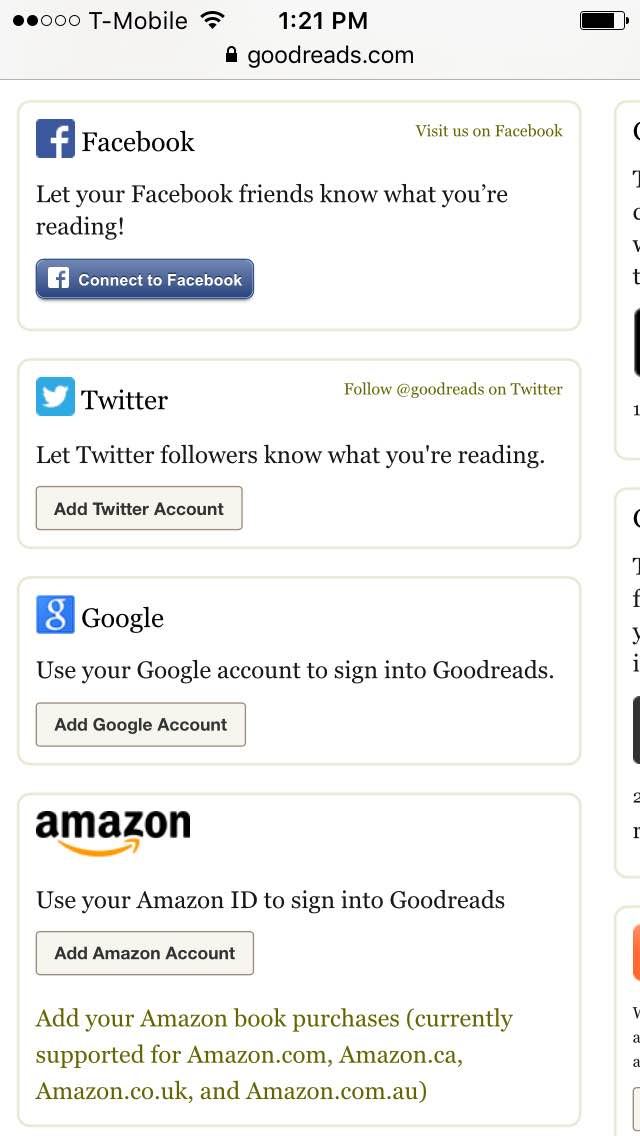
I’ll let you all come to your own determinations. Personally, I think the road ahead of us will be a bumpy one, and sadly, we really don’t have a choice. Amazon is the current market leader for self-published writers like me. Reviews are so hard to come by these days, and with these preventative measures Amazon has set in place, legitimate reviews will be hard to distinguish from unethical ones…and in case you were wondering, to this day there are people out there who buy reviews. Look below.
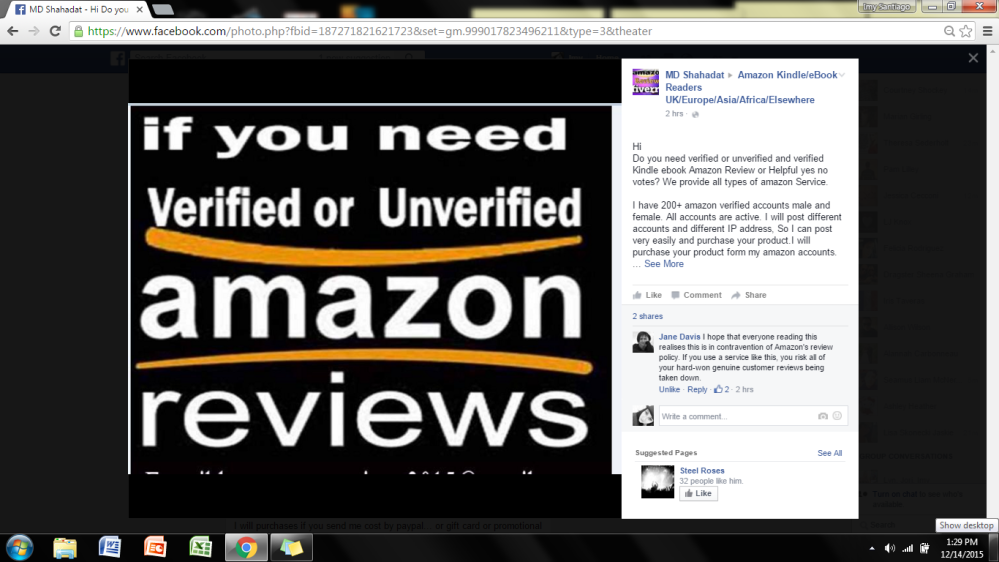
How can honest writers (who are already struggling for visibility, and to acquire hard-earned reviews written by legitimate readers) shine when there are unethical peers still utilizing the services of people and companies like these?
I get it, Amazon. I get it. Not all self-published writers/authors/artists are dishonest. Take a closer look at your algorithms, and make a fair assessment. It’s hard enough to put your work out there, and you keeping a percentage of our revenue, but to limit how we interact with our favorite writers/authors/artists outside of your “realm” is a bit too much.
Like I mentioned above, make your own determinations. Whether or not you agree with me, this is something that affects us all in the long run.
Thanks for reading, and Seasons Greetings.
Peace.
-i
I have the distinct impression that Amazon has many subsidiaries – we know that KDP and Create Space are part of them. Have heard Lulu could be, too and am pretty sure Goodreads is part of them… wonder how the Amazon empire compares to AT&T, prior to being torn apart due to the monopoly regulations…
LikeLike
That’s an excellent point!
I don’t know, but I hope Amazon reevaluates their course of action. Personally, I have given up on the idea that my reviews will be viewed as legitimate on their site. It’s a flawed system; I’ve always wondered if my reviews were negative in nature the outcome would be different… Regardless, it saddens me that because of a few bad apples, many writers will see a drastic shift in their way of conducting business, not to mention sales of their books. Hopefully in the not-so-distant future a new company will emerge that will give Amazon a run for their money. Until then, here’s hoping.
LikeLiked by 1 person
My fingers are crossed that your hopes come true.
To the best of my knowledge, all my reviews have been posted, though I have had reports from some fans that their reviews ‘bounced’ … that was not a word they used, but I write YA and choose not to type the actual verbiage used.
Another way Amazon causes me to wonder about their motives is the way KDP Select (or whatever it is called – I don’t use it) demand that they are basically the only one with the contract to sell it.
I, personally, prefer to deal with Smashwords – this could be because the majority of my sales are through them, but I believe it is also because they have no objections/consequences for authors who have their book available through a variety of sources. In fact, they encourage it.I also love their coupon feature.
LikeLiked by 2 people
Most of the authors I read now I found online and then I liked their books so I decided to follow their blogs and Twitter feeds. Since I’m not of FB anymore I don’t follow them there but if I bought and like a book it shouldn’t be against leaving a review just because I followed somebody I don’t know on a social site. Following allows me to keep up with new books. I don’t like KDP for many reasons, but I don’t really like not being able to put the book elsewhere because not everybody has a Kindle.
LikeLike
I know how you feel. Trust me, it’s to a point heartbreaking that books whose authors deserve recognition are continuously falling by the wayside.
LikeLiked by 1 person